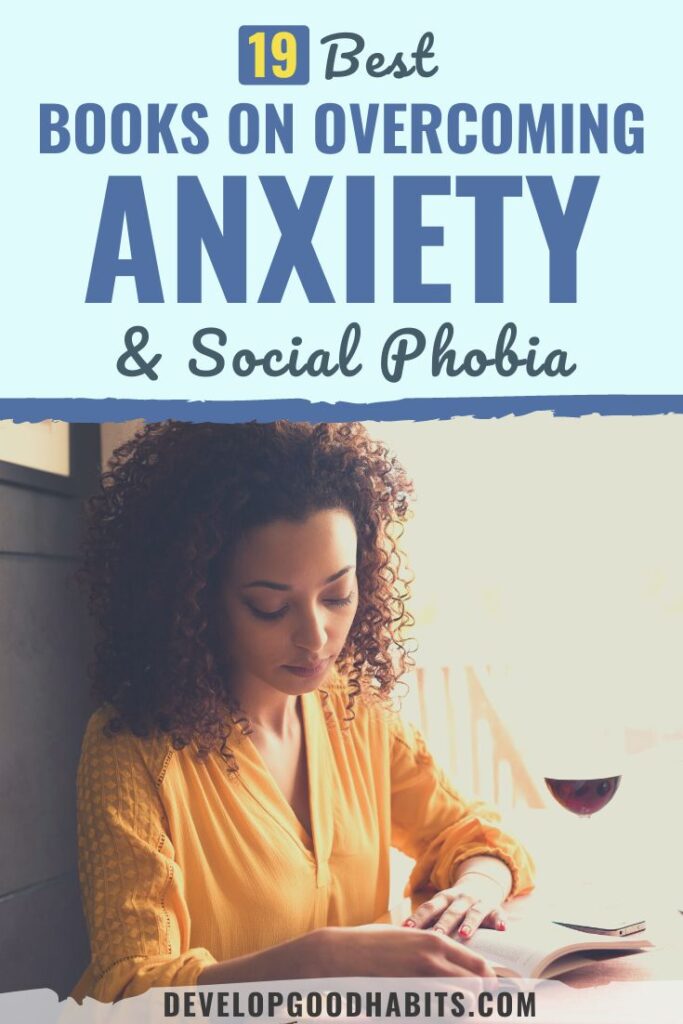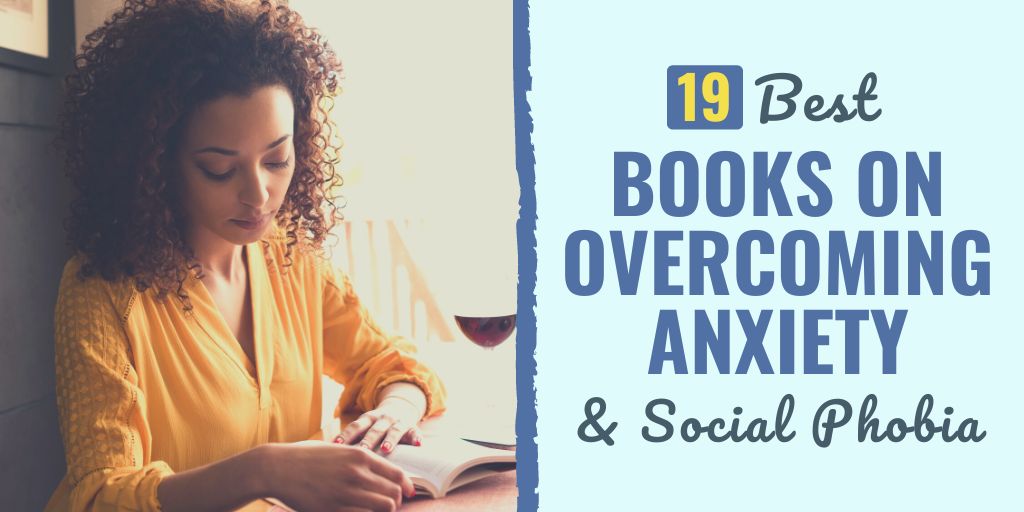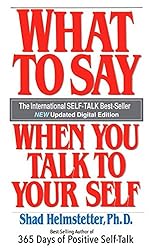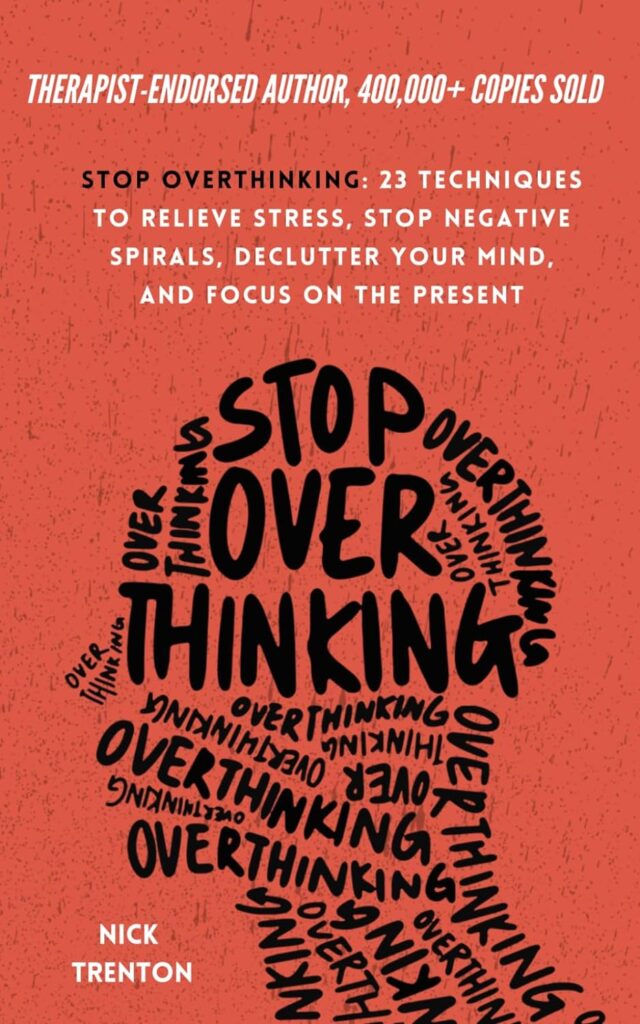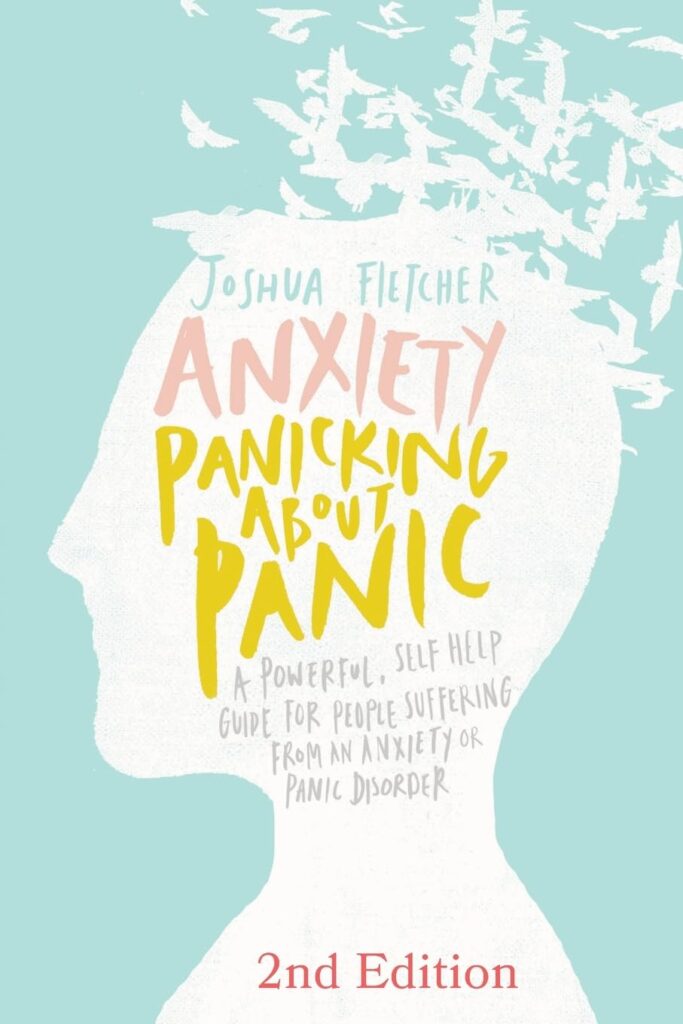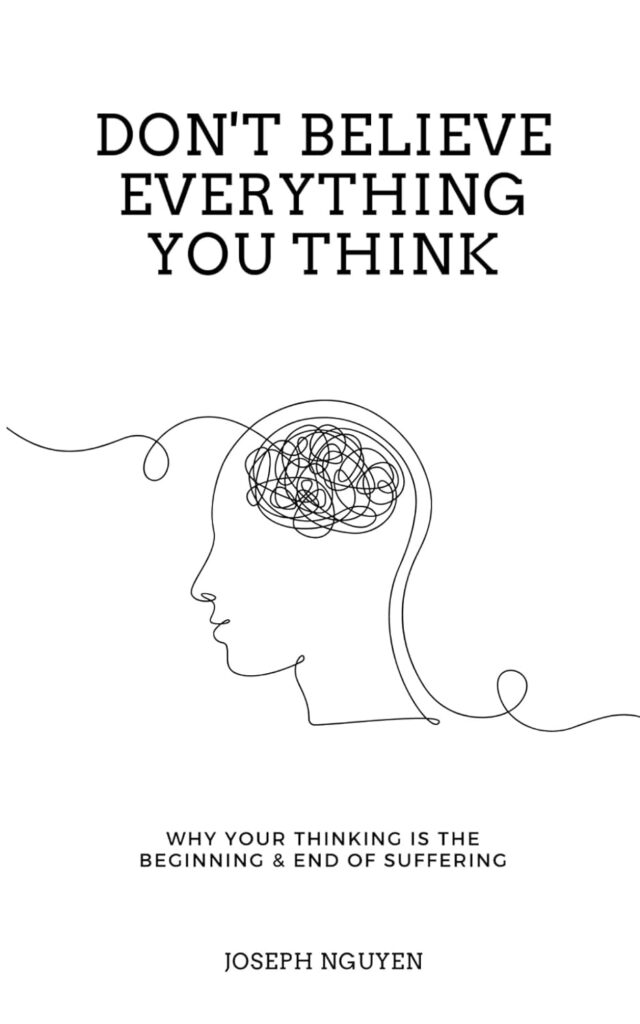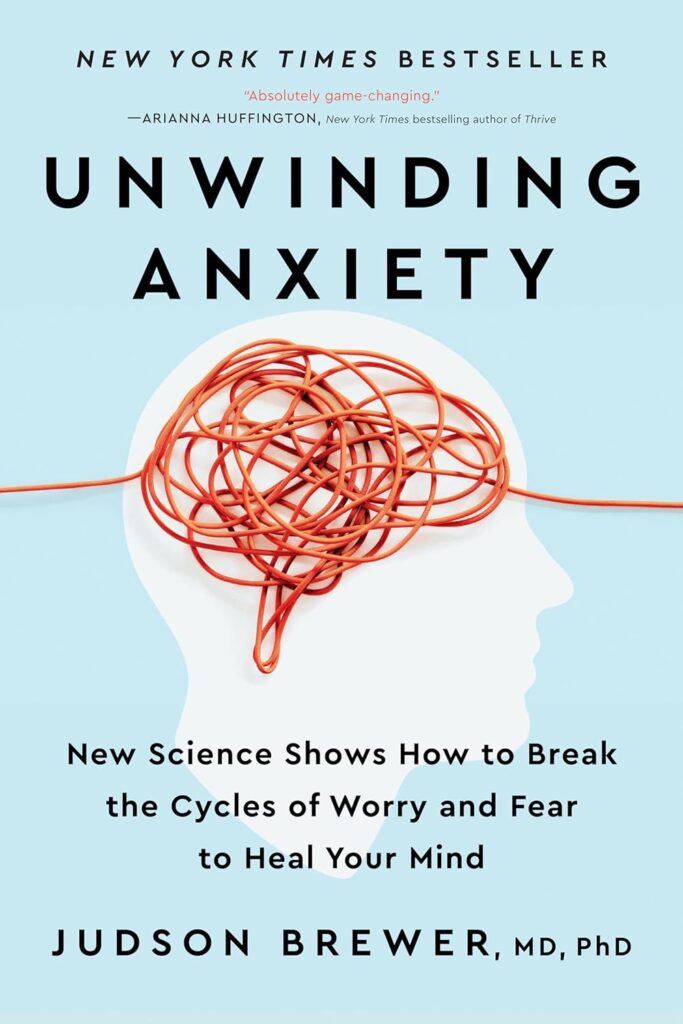What are the best anxiety books? What books should you be reading to overcome anxiety and live a happier and fuller life?
Anxiety is a disorder that many people cope with daily. It had a major impact on the lives of over 40 million Americans last year, and who knows how many more minor impacts?
The question is how we deal with anxiety. Whether it controls us, or we control it. This is something that is completely within our control. The 19 books on anxiety on this list are the best books for taking charge of your life and controlling your anxiety.
These books on anxiety are varied. Some books are technical, written by experts who have spent their lives researching anxiety. Other books on this list are written by experts with years of experience counseling those afflicted with anxiety.
Finally, there are personal tales of people's own experience getting control of their anxiety.
Lots of good books here.
If you are one of the millions of people who suffer from anxiety you will find the best books on anxiety below.
Get informed. Get inspired. Make those habit changes in your life to get your anxiety under control.
19 Best Anxiety Books List
1. Monkey Mind by Daniel Smith
Check Price on Amazon | Check Audiobook Price
Takeaways:
- Monkey Mind provides a candid and humorous exploration of living with anxiety, offering insights into the author's personal struggles and coping mechanisms.
- Daniel Smith delves into the complexities of anxiety disorders, shedding light on the challenges, stigma, and impact on daily life, relationships, and self-perception.
- The book offers a relatable and honest portrayal of navigating anxiety, providing a sense of validation and understanding for those experiencing similar struggles.
- Smith shares various strategies and therapies he has explored in managing his anxiety, offering a mix of personal anecdotes and research-based insights.
- Monkey Mind encourages a compassionate and empathetic approach towards individuals dealing with anxiety, while also highlighting the potential for growth, resilience, and self-discovery amidst the turmoil of mental health challenges.
A witty and insightful book that charts the landscape of what it is to have anxiety. It is a single person’s story of dealing with severe anxiety.
Daniel's story touches the lives of everyone who has ever dealt with the doubt and despair of severe anxiety. His story is funny, gripping and above all – real!
This book is an interesting look into a single person’s experience with anxiety.
However, do not think that it is going to answer all the questions and tell you how to live a life with anxiety. That is not what this book is for. Many other books on this list give some great actionable ideas on what to do about anxiety.
Monkey Mind: A Memoir on Anxiety is more about the author relating his unique experiences.
However, if you know someone with severe anxiety, or suffer from it yourself, chances are there will be a lot to relate to with his interesting story.
Want to find out more about the psychological condition of “Monkey Mind”? Check out this post: How to quiet your monkey mind.
2. Feeling Good by David D. Burns
Takeaways:
- Feeling Good outlines cognitive behavioral techniques to challenge and change negative thought patterns that contribute to depression and anxiety.
- The book emphasizes the importance of identifying and reframing cognitive distortions, offering practical exercises and tools to promote emotional well-being.
- David D. Burns introduces the concept of the “Daily Mood Log” as a method for tracking and challenging negative thoughts, emotions, and behaviors.
- Feeling Good provides guidance on developing healthier self-esteem, improving communication skills, and fostering more satisfying relationships.
- The book empowers readers to take an active role in their mental health by offering actionable strategies to overcome depression and anxiety, promoting a sense of hope and agency in the process.
Pessimism, guilt, anxiety and low self-esteem are all too common these days. It is far too easy to let these negative emotions get to us: keeping us down and feeling sad and lonely.
In “Feeling Good: The New Mood Therapy” noted psychiatrist, Dr. David Burns, outlines many ways to deal with all the negative emotions in his new book on anxiety.
“Feeling Good” teaches:
Just like the title says, Dr. Burns's book is all about “feeling good”.
He teaches us how to use cognitive therapy techniques to get rid of negative thoughts and decrease depression. There may not be a magic bullet to forever “end” depression and anxiety. But this great anxiety book gives excellent tools for controlling anxiety.
Note: Dr. Burns also has a companion book to this one: the Feeling Good Handbook. In some ways, this book goes beyond the original, but there is a lot of overlap between these two books on anxiety. One of the big differences being that the workbook has more worksheets.
My recommendation: read the less expensive “Feeling Good” first. If you enjoy that, then get the workbook to act as a refresher and companion piece.
3. The Anxiety and Phobia Workbook by Edmund Bourne
Check Price on Amazon | Check Audiobook Price
Takeaways:
- The Anxiety and Phobia Workbook offers a comprehensive guide to understanding and managing various anxiety disorders and phobias through cognitive-behavioral techniques.
- Edmund Bourne provides practical exercises, relaxation techniques, and coping strategies to help individuals confront and overcome their anxiety.
- The book emphasizes the importance of self-awareness, self-care, and self-compassion in the process of managing anxiety and phobias.
- Bourne addresses the role of lifestyle factors, such as nutrition, exercise, and stress management, in supporting overall mental well-being and reducing anxiety symptoms.
- The Anxiety and Phobia Workbook empowers readers to take an active role in their recovery by providing a wealth of information, tools, and guidance for managing and alleviating anxiety and phobias.
The Anxiety and Phobia Workbook is one of the classic books on the subject of anxiety. It has been read and recommended by psychiatrists and psychologists for years.
This book does an excellent job of giving a clear and concise understanding of the causes of anxiety. It also shares many great ideas of many of the treatment options available. This book on anxiety also delivers a multitude of strategies that can fit different people with differing levels of anxiety. After all, not all people suffer anxiety in the same way, so the treatments should not be cookie cutter.
A great educational resource updated with the latest and greatest on the science of dealing with anxiety.
With this workbook, you'll learn a range of proven methods for overcoming anxiety:
This workbook includes many great methods for coping with anxiety.
4. Furiously Happy by Jenny Lawson
Check Price on Amazon | Check Audiobook Price
Takeaways:
- Furiously Happy offers a candid and humorous exploration of living with mental illness, providing insight into the author's experiences with depression and anxiety.
- Jenny Lawson shares personal anecdotes and unconventional perspectives on mental health, encouraging readers to find humor and joy amidst the challenges of mental illness.
- The book celebrates the resilience and strength found in embracing one's unique quirks and struggles, promoting a message of acceptance and self-expression.
- Lawson's writing blends humor and vulnerability, fostering a sense of connection and understanding for those navigating their own mental health journeys.
- Furiously Happy challenges stigmas surrounding mental illness and offers a refreshing and uplifting perspective on finding moments of joy and absurdity in the midst of emotional turmoil.
Funny and anxiety are two words that are rarely used in conjunction with each other. It is hard to find funny things about the soul-sucking feeling of anxiety. Jenny Lawson manages to tow that line creating a book about anxiety that is hysterically funny, educational and touching.
So many books on this list are clinical. They have great ideas on how to cope with anxiety and depression. Furiously Happy: A Funny Book about Horrible Things is certainly the only one that is actually laugh-out-loud funny.
With her unique voice sharing her personal experiences in a collection of essays Lawson gives a glimpse into her unique mind.
This book is a journey with and lots of laughs for those who have only had sadness when dealing with anxiety. A great break from books teaching you how to deal with your problems.
5. Hardcore Self Help by Robert Duff Ph.D
Check Price on Amazon | Check Audiobook Price
Takeaways:
- Hardcore Self Help provides a no-nonsense approach to mental health, offering practical advice and strategies without jargon or fluff.
- Robert Duff, Ph.D., presents relatable and accessible guidance on managing mental health challenges, making the content easy to understand and apply.
- The book empowers readers to take charge of their mental well-being through actionable steps and realistic recommendations.
- Duff addresses a wide range of mental health topics, including anxiety, depression, and relationships, catering to a diverse audience seeking self-help resources.
- Hardcore Self Help offers a refreshing and straightforward perspective on mental health, promoting a sense of empowerment and self-improvement without overwhelming clinical terminology.
Hardcore Self Help: F**k Anxiety is likely not for everyone. But if you like honest, plainspoken, blunt advice, and don't mind some colorful language, this might be the anxiety book that is perfect for you.
It takes some the stigma out of mental illness, with the author talking more like a friend than delivering lectures on what steps to take.
None of the information is exactly “new” in this book. Many of the other books on dealing with anxiety cover the same ground, often in more detail.
The strength of this anxiety book is the unique delivery of details in such an easygoing manner. The lack of scientific jargon makes this eminently readable and able to reach everyone. A great read for anyone who likes plain speaking and honest hard truths.
6. Anxiety as an Ally by Dan Rykart
Check Price on Amazon | Check Audiobook Price
Takeaways:
- Anxiety as an Ally reframes anxiety as a potential source of strength and wisdom, challenging the conventional view of anxiety as purely negative.
- Dan Rykart shares personal experiences and insights, offering a compassionate and relatable perspective on living with anxiety.
- The book encourages readers to embrace and work with their anxiety, highlighting its potential to fuel creativity, motivation, and personal growth.
- Rykart provides practical strategies and mindfulness techniques to help individuals navigate and harness the energy of anxiety in a positive and constructive manner.
- Anxiety as an Ally promotes a shift in mindset, encouraging readers to view anxiety as a potential ally and catalyst for self-discovery and resilience.
This is another personal story about how one man went from having a panic attack during a roll call to becoming a successful public speaker. It details the lessons he learned the steps he used and the training he underwent to make this transformation.
It is always a nice change of pace to move from dull fact-based books with solid strategies for beating anxiety, to these personal accounts. There is something special about reading the trials that others faced and how they specifically dealt with the issues.
For anyone who feels that they are alone when facing anxiety, Dan’s book lets them know they are not alone and that they can get better. Using simple writing Dan tells his inspiring story and shares a ton of good ideas for decreasing anxiety in the process.
A personal, well written and engaging book on anxiety and coping strategies.
7. What to Say When You Talk To Your Self by Dr. Shad Helmstetter
Check Price on Amazon | Check Audiobook Price
Takeaways:
- What to Say When You Talk to Your Self delves into the power of self-talk and its impact on shaping beliefs, behaviors, and outcomes.
- Dr. Shad Helmstetter explores the concept of self-programming, emphasizing the influence of internal dialogue on one's self-image and success.
- The book offers practical techniques for reprogramming negative self-talk, enabling readers to cultivate a more positive and empowering inner dialogue.
- Helmstetter provides actionable strategies for creating and implementing personalized affirmations to support self-improvement and goal achievement.
- What to Say When You Talk to Your Self underscores the significance of conscious, positive self-talk in fostering confidence, motivation, and personal transformation.
While not specifically a book on dealing with anxiety, What to Say When You Talk To Your Self is an important self-help book milestone, that every person who does have anxiety should read at some point.
Dr. Helmstetter’s book is about the power of the mind. In fact, according to this book we can become what we think and tell ourselves.
This book teaches us some easy tools and methods to use the power of our minds to stop unwanted thinking/behavior patterns in their tracks. It teaches us to “erase and replace” these negative thoughts that hold us back, such as anxiety with thoughts that can give a positive mindset and can help to build our successful lives.
8. The 10 Best-Ever Anxiety Management Techniques by Margaret Wehrenberg
Takeaways:
- The 10 Best-Ever Anxiety Management Techniques offers a practical and accessible guide to managing anxiety, providing evidence-based strategies for individuals seeking relief.
- Margaret Wehrenberg presents a comprehensive toolkit of techniques, including cognitive-behavioral and mindfulness-based approaches, to address various forms of anxiety.
- The book emphasizes the importance of understanding the physiological and psychological aspects of anxiety, offering insights into the brain's response to stress and fear.
- Wehrenberg provides actionable exercises and techniques for managing anxiety symptoms, such as relaxation, cognitive restructuring, and exposure therapy.
- The 10 Best-Ever Anxiety Management Techniques empowers readers to proactively address and reduce anxiety, promoting a sense of control and resilience in the face of mental health challenges.
Wherenberg’s The 10 Best-Ever Anxiety Management Techniques: Understanding How Your Brain Makes You Anxious and What You Can Do to Change It is based on a simple concept. If you want to fix a problem in your brain, you need to understand your brain.
She gives good scientific explanations of the causes of anxiety and then 10 brain science techniques that actually work, without needing to resort to medication.
The chapters that deal with the specific physical and cognitive and behavioral tools for handling anxiety are excellent. They get right to the point and can have a big impact, specifically for those who do not currently see a psychologist (who may recommend similar techniques).
Full of practical tips that you can immediately put to use in combating anxiety, this workbook can be very helpful to those dealing with generalized anxiety, social anxiety or even panic.
9. My Age of Anxiety by Scott Stossel
Check Price on Amazon | Check Audiobook Price
Takeaways:
- My Age of Anxiety offers a deeply personal and insightful exploration of the author's experiences with anxiety, weaving together historical, scientific, and cultural perspectives on the condition.
- Scott Stossel delves into the complexities of anxiety disorders, shedding light on the impact of genetics, environment, and societal influences on anxiety.
- The book provides a comprehensive overview of various anxiety treatments and coping mechanisms, offering a nuanced understanding of the challenges and opportunities in managing anxiety.
- Stossel's narrative blends vulnerability and research, fostering empathy and understanding for individuals navigating their own anxiety journeys.
- My Age of Anxiety invites readers to reconsider the perception of anxiety, offering a rich tapestry of personal anecdotes and scholarly insights to illuminate the multifaceted nature of this prevalent mental health issue.
The author of My Age of Anxiety: Fear, Hope, Dread, and the Search for Peace of Mind is not writing about a clinical dull topic. He is writing about something that matters to him because he has suffered from anxiety for many years.
While Scott discusses his personal feelings and his own personal situation vis-a-vis anxiety, those discussions are not all this book is about. He spent years avidly researching every single facet of dealing with anxiety and shares this knowledge in this great book.
This book hits all the important points of coping with anxiety. Stossel discusses the social, neurological, and environmental causes of anxiety as well as many tools and tricks for decreasing the impact of these anxiety triggers.
He discusses the specific experiences of many people and their anxiety, including but not limited to his own experiences. In one important section he talks quite a bit about pharmaceutical solutions, their side effects and alternate forms of treatment.
Some other anxiety books may go deeper into treatments and causes of anxiety. Some books are more personal and revealing. Some books may have more cutting edge science, being written by leading researchers. But this anxiety book is the one that really hits ALL the bases in its thorough discussion of the topic.
10. Dare McDonagh
Check Price on Amazon | Check Audiobook Price
Takeaways:
- Dare presents a practical and empowering approach to overcoming anxiety, focusing on acceptance and resilience rather than avoidance and control.
- Barry McDonagh introduces the DARE response as a method to diffuse anxiety, emphasizing the importance of facing fears and embracing discomfort.
- The book provides actionable strategies and exercises to help individuals reframe their relationship with anxiety and regain a sense of control over their thoughts and emotions.
- McDonagh encourages readers to adopt a mindset of acceptance and courage, offering a roadmap for navigating anxiety with a sense of empowerment and self-assurance.
- Dare promotes a shift in perspective, advocating for a proactive and compassionate approach to managing anxiety, fostering a sense of liberation and confidence in the process.
Yet another “must-read” anxiety book for people who believe that it is impossible to live life without panic attacks or anxiety.
The tools, examples and in-depth explanations in Dare: The New Way to End Anxiety and Stop Panic Attacks are down to earth and extremely motivational. Not only are these pages filled with great facts, but it inspires you to go out and make changes in your life.
Based on science and Barry’s personal experiences helping those who suffer from debilitating anxiety. Barry shares a comprehensive guide that draws from his extensive experience helping those who suffer from anxiety and panic attacks.
Based on hard science and over 10 years experience. Barry shares his most techniques for helping people who suffer from anxiety. The DARE technique can be used by everyone. Age or background do not matter. It is possible to live a life free from anxiety or panic attacks.
In this step-by-step anxiety guide you will discover methods to do things like:
11. The Anxiety Toolkit by Alice Boyes PHD
Check Price on Amazon | Check Audiobook Price
Takeaways:
- The Anxiety Toolkit offers practical and evidence-based strategies for understanding and managing anxiety, providing a comprehensive set of tools for emotional well-being.
- Alice Boyes, PHD, explores cognitive, behavioral, and interpersonal techniques to address anxiety, catering to a diverse range of anxiety-related challenges.
- The book emphasizes the role of self-awareness and self-compassion in managing anxiety, offering insights into the interplay between thoughts, emotions, and behaviors.
- Boyes provides actionable exercises and worksheets to help individuals navigate and reframe anxiety-inducing situations, promoting a sense of empowerment and agency.
- The Anxiety Toolkit equips readers with a versatile and adaptable set of tools, fostering resilience, self-discovery, and emotional balance in the face of anxiety.
One problem with many self-help books is that they spend too much time preaching their techniques. They often supply some good material, they make you think… but they do not inspire follow-through and action.
I am a big believer in taking action and always appreciate books that encourage you, either by design or by inspiration to take the steps they offer and actually put them into action. The Anxiety Toolkit: Strategies for Fine-Tuning Your Mind and Moving Past Your Stuck Points does that!
This book gets right to the heart of the different ways anxiety affects the lives of its sufferers.
Anxiety Toolkit gives great detail on what causes people to feel anxiety as well as clear steps to decrease anxiety. The key to this book is its approach to dealing with anxiety.
Anxiety Toolkit is an interactive book. It is full of things like quizzes to ensure you are truly learning the material and making your learning experience worthwhile.
12. Change Your Brain, Change Your Life by Dr. Daniel G. Amen
Check Price on Amazon | Check Audiobook Price
Takeaways:
- Change Your Brain, Change Your Life explores the connection between brain health and overall well-being, offering insights into the impact of brain function on mental and physical health.
- Dr. Daniel G. Amen provides practical strategies for optimizing brain health, including nutrition, exercise, and cognitive techniques, to enhance mental resilience and emotional balance.
- The book introduces brain imaging technology as a tool for understanding and addressing various mental health conditions, shedding light on the biological underpinnings of behavior and emotions.
- Amen emphasizes the significance of personalized treatment approaches, offering a holistic framework for improving brain function and mental health based on individual needs.
- Change Your Brain, Change Your Life empowers readers to take an active role in their brain health, promoting a sense of agency and potential for positive change through targeted lifestyle modifications and therapeutic interventions.
This is not “simply” a book about anxiety. It has sections dealing with all sorts of emotional issues: anger, focus, anxiety, depression, obsession, lack of focus and memory issues.
Change Your Brain, Change Your Life: The Breakthrough Program for Conquering Anxiety, Depression, Obsessiveness, Lack of Focus, Anger, and Memory Problems is a thorough academic (yet practical) book about the relationship between our brain patterns and problem-behavior that can help us cure a myriad of mental problems.
One of the major differences between this book and others is the stance on using prescription drugs.
Many books take a stance against these drugs or at least offer alternatives without drugs, while this book lays out many strong arguments for drugs in some situations and lets the readers know when they should be used and when avoided.
Although I am strongly against over-the-counter medication and I think many are too ready to turn to drugs as a solution to problems, there certainly are times when drugs might be the answer, and I like the balanced approach this book brings to the subject.
13. The Highly Sensitive Person by Elaine N. Aron
Check Price on Amazon | Check Audiobook Price
Takeaways:
- The Highly Sensitive Person delves into the traits and experiences of individuals with high sensitivity, offering validation and understanding for those who may feel overwhelmed by their environment.
- Elaine N. Aron provides insights into the neurological and psychological aspects of high sensitivity, shedding light on the unique processing of sensory information in sensitive individuals.
- The book offers practical guidance for navigating the challenges of high sensitivity, including strategies for managing overstimulation and embracing the strengths associated with this trait.
- Aron emphasizes the importance of self-acceptance and self-care for highly sensitive individuals, promoting a compassionate and empowering approach to understanding and thriving with sensitivity.
- The Highly Sensitive Person fosters a sense of community and self-awareness, offering a roadmap for harnessing the benefits of high sensitivity while mitigating the potential challenges.

If any of these questions sound like they could refer to you, then you may well be a highly sensitive person.
These symptoms for an HSP are more than just aspects of your personality. An HSP is just more susceptible to stimulation (e.g., from loud noise, bright lights, strong odors, large crowds, etc.) than most.
The Highly Sensitive Person – How to Thrive When the World Overwhelms You makes you aware of exactly what makes up HSP. Additionally, it teaches how an HSP can properly balance their lives to keep from feeling overwhelmed.
Just because someone has anxiety does not automatically make someone HSP, and all people who are HSP do not necessarily surer from anxiety. But there is a lot of overlap.
The high susceptibility to stimulation often means that an HSP will feel anxious and overwhelmed in social situations. Due to this fact it is important to understand yourself and know whether you need to treat common anxiety or just balance your life effectively to not get overwhelmed.
14. Rewire Your Anxious Brain by Catherine M Pittman PhD
Check Price on Amazon | Check Audiobook Price
Takeaways:
- Rewire Your Anxious Brain offers a comprehensive understanding of anxiety and provides practical strategies for rewiring the brain's response to stress and fear.
- Catherine M. Pittman, PhD, explores the neuroscience behind anxiety, offering insights into the brain's role in perpetuating and alleviating anxiety symptoms.
- The book introduces evidence-based techniques, such as cognitive restructuring and mindfulness, to help individuals rewire their brain's response to anxiety triggers.
- Pittman empowers readers to proactively address anxiety, offering a roadmap for reshaping neural pathways and promoting emotional resilience.
- Rewire Your Anxious Brain provides actionable tools and exercises to help individuals cultivate a more adaptive and balanced response to anxiety, fostering a sense of control and well-being.
In Rewire Your Anxious Brain: How to Use the Neuroscience of Fear to End Anxiety, Panic, and Worry, Catherine Pittman offers a unique, evidence-based solution to overcoming anxiety based on cutting-edge neuroscience and research.
Discover how the amygdala and cortex are keys to the neuropsychology of anxiety, and what you can actually do to control these feelings where they start –your brain.
Personally I have read books like this before. It is a useful and well-written book, but it does not really break any new ground or have a unique perspective. What it does well is cover the complete causes of anxiety in the brain and give an idea about how we can all make habit and life changes and deal with it.
Those that have been in treatment for anxiety or done DBT or CBT will find this book a refresher at best. IF you suffer from anxiety yet do not know what DBT or CBT is… this might be a good science-based book to start with.
15. Anxiety by John Franz
Takeaways:
- Understanding the root causes of anxiety. The book delves into the various factors that contribute to anxiety, including genetics, environment, and life experiences.
- Coping mechanisms and strategies. It offers practical advice and techniques for managing and reducing anxiety, such as mindfulness, cognitive behavioral therapy, and relaxation exercises.
- Impact on physical health. The book explores the connection between anxiety and physical health, highlighting the potential effects on the immune system, cardiovascular health, and overall well-being.
- Navigating relationships and social situations. It provides insights on how anxiety can impact relationships and offers guidance on communicating with loved ones and navigating social interactions.
- Empowerment and hope. Through real-life stories and examples, the book instills a sense of empowerment and hope, emphasizing that anxiety can be managed and overcome with the right support and strategies.
Earlier I mentioned a book that openly discussed prescription medications as possible cures to many anxiety disorders. This is something that rarely happen in books, which often go for a more holistic approach. Anxiety: 5 Little Known Ways to Naturally Fight Anxiety is the opposite of that previous choice. It heads in the opposite direction just discussing natural cures for relieving anxiety.
To be completely honest, I am a bit of a traditionalist. Crazy sounding solutions are not always for me. However, anyone who suffers anxiety is going to want to get all the options possible to help deal with their anxiety.
These solutions are off the beaten path. They are certainly not the ONLY thing you should be trying to do to fight anxious feelings, but they are interesting nonetheless.
If you are building a toolkit to combat anxiety why wouldn’t you want to try to understand all the tools that could be at your disposal?
To give you an idea of what this book discusses here are some of the natural ways to fight anxiety discussed:
Not the only ways to combat anxiety, but these are methods you may not discover elsewhere.
16. Stop Overthinking by Nick Trenton
Check Price on Amazon | Check Audiobook Price
Takeaways:
- Recognizing overthinking patterns. Stop Overthinking: 23 Techniques to Relieve Stress, Stop Negative Spirals, Declutter Your Mind, and Focus on the Present helps readers identify their overthinking habits and understand the negative impact it can have on their lives and decision-making processes.
- Practical strategies for breaking the cycle. It provides actionable steps and techniques to stop overthinking, such as mindfulness practices, setting boundaries, and reframing negative thought patterns.
- Embracing uncertainty. The book encourages readers to embrace uncertainty and let go of the need for absolute control, fostering a more flexible and adaptive mindset.
- Building self-awareness and self-compassion. It emphasizes the importance of self-awareness and self-compassion in overcoming overthinking, offering exercises and tools to cultivate these qualities.
- Cultivating a balanced perspective. The book promotes a balanced approach to thinking, helping readers differentiate between productive problem-solving and unproductive rumination.
17. Anxiety: Panicking About Panic by Joshua Fletcher
Check Price on Amazon | Check Audiobook Price
Takeaways:
- Understanding the nature of panic attacks. Anxiety: Panicking about Panic. A Powerful, Self-Help Guide for Those Suffering From an Anxiety or Panic Disorder (2nd Edition) provides insights into the physiological and psychological aspects of panic attacks, helping readers understand the underlying mechanisms.
- Challenging fear-based thinking. It offers strategies for challenging and reframing fear-based thoughts and beliefs, empowering individuals to regain control over their anxiety.
- Mindfulness and relaxation techniques. The book introduces mindfulness and relaxation exercises as tools for managing panic attacks and reducing overall anxiety levels.
- Lifestyle adjustments for anxiety management. It discusses the role of lifestyle factors such as diet, exercise, and sleep in managing anxiety, offering practical tips for making positive changes.
- Long-term recovery and resilience. The book focuses on building resilience and long-term recovery from panic attacks, providing a roadmap for overcoming anxiety and leading a fulfilling life.
18. Don’t Believe Everything You Think by Joseph Nguyen
Check Price on Amazon | Check Audiobook Price
Takeaways:
- Don’t Believe Everything You Think: Why Your Thinking Is the Beginning & End of Suffering emphasizes that our thoughts are not always accurate reflections of reality, and it’s important to question and challenge them.
- Cognitive distortions, such as black-and-white thinking and catastrophizing, can lead to negative emotions and behaviors.
- Mindfulness and self-awareness can help us observe our thoughts without getting caught up in them, leading to greater emotional resilience.
- Developing a growth mindset can help us reframe our thoughts and beliefs to promote personal growth and positive change.
- Building self-compassion and self-acceptance can counteract the harmful effects of negative thought patterns and improve overall well-being.
19. Unwinding Anxiety by Judson Brewer
Check Price on Amazon | Check Audiobook Price
Takeaways:
- Unwinding Anxiety: New Science Shows How to Break the Cycles of Worry and Fear to Heal Your Mind explains that anxiety often stems from habitual thought patterns and behaviors that can be understood and addressed through mindfulness and self-awareness.
- Identifying the triggers and rewards associated with anxious thoughts and behaviors can help in breaking the cycle of anxiety.
- Cultivating curiosity and openness to the physical sensations and emotions associated with anxiety can lead to a more adaptive response to them.
- Developing self-compassion and non-judgmental awareness can reduce the impact of anxiety and promote emotional well-being.
- Understanding the neuroscience of anxiety can provide insights into how the brain processes and perpetuates anxious thoughts, offering potential strategies for managing anxiety more effectively.
BONUS: Feeling Great: The Revolutionary New Treatment for Depression and Anxiety
Check Price on Amazon | Check Audiobook Price
Takeaways:
- Cognitive distortions, such as all-or-nothing thinking and mental filtering, can significantly contribute to depression and anxiety.
- Identifying and challenging negative thoughts through techniques like the “double standard technique” and “examine the evidence” can lead to significant improvements in mood.
- Behavioral activation, including scheduling enjoyable activities and setting achievable goals, can be a powerful tool in overcoming depression and anxiety.
- The concept of “emotional flooding” highlights the importance of acknowledging and processing intense emotions to prevent them from overwhelming us.
- Developing self-compassion and practicing gratitude can play a crucial role in combating depression and anxiety and promoting emotional well-being.
Feeling Great: The Revolutionary New Treatment for Depression and Anxiety is the newest addition to this list. Hence I only added it (for now) as an addition to this list.
But the potential on this book is great.
It is a semi-sequel to one of the seminal works on anxiety relief- “Feeling Good: The New Mood Therapy” (#2 on this list). Written 20 years after the first version of that book, and 8 years after the last major update, this book is sure to have the latest and greatest lessons on relieving anxiety and “feeling great”
Final Thoughts on Anxiety Books
That is it for the anxiety books. I hope you enjoyed them.
If you are more concerned with managing your stress, why not jump directly to this list of 16 best books on stress.
Are there anxiety books missing from this list? Are there books on anxiety that don't quite fit? Do you find this list useful? Do you have any favorites? Make sure to let me know in the comments on the main page of the 250+ Best Habit Books List
And if you're looking for more resources on anxiety, be sure to check out these blog posts:
- 11 Natural Ways to Quickly Stop an Anxiety Attack
- Declutter Your Mind: Eliminate Worry, Relieve Anxiety, and Stop Negative Thoughts
- 11 Best Hobbies for People with Anxiety to Relax
